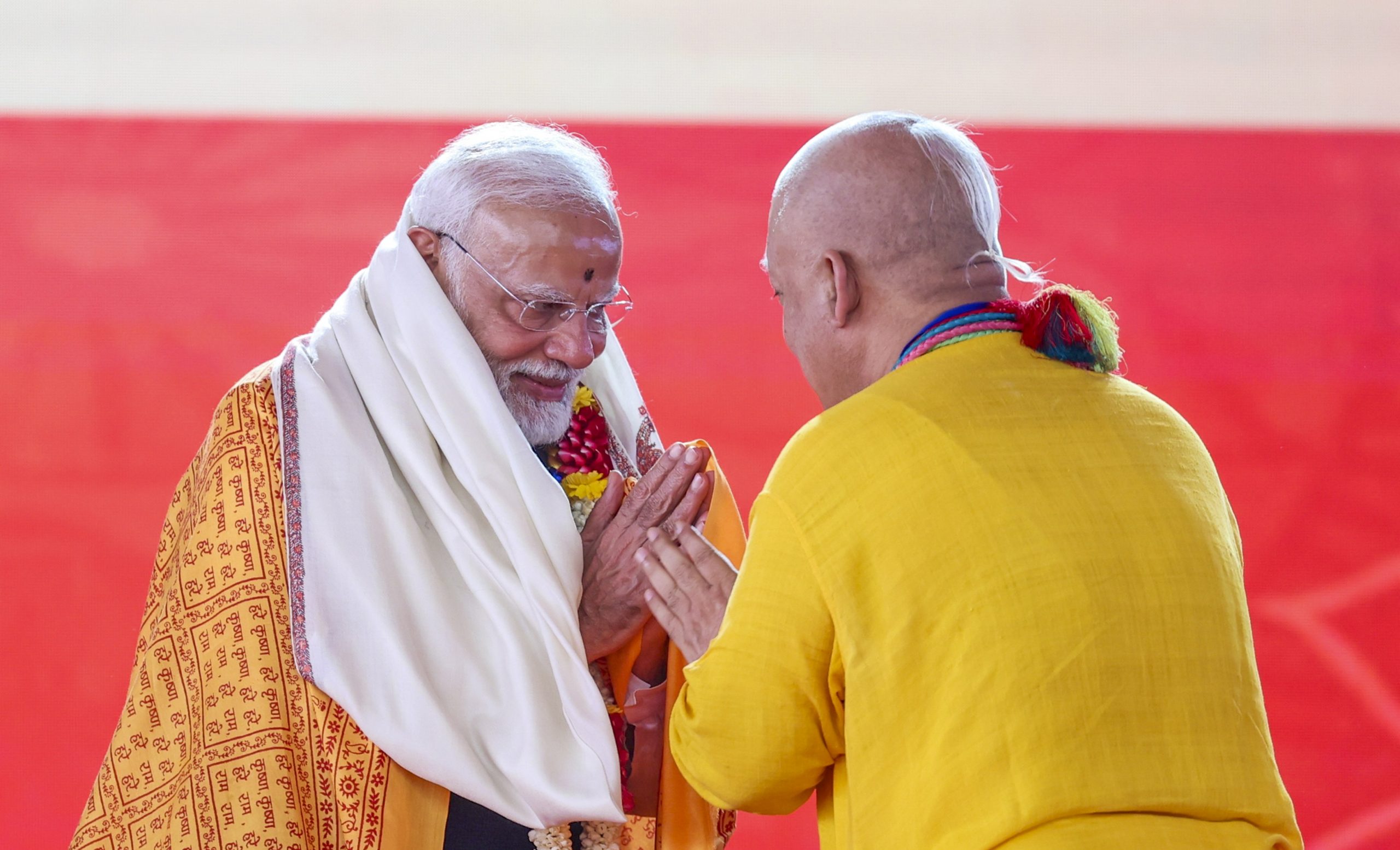NAVI MUMBAI, Jan 15: Prime Minister Narendra Modi emphasized on Wednesday that India’s spiritual heritage is deeply rooted in a commitment to service, a principle his government has upheld for over a decade in pursuit of the public good.
While inaugurating an ISKCON (International Society for Krishna Consciousness) temple in Kharghar, Navi Mumbai, Modi, who began his third term in office last June, highlighted various welfare initiatives undertaken by his administration, including the construction of toilets, housing for the underprivileged, provision of LPG connections, and medical insurance.
“This spirit of service embodies true social justice and represents authentic secularism. The essence of our spiritual culture lies in this dedication to service. India is more than mere geographical borders; it is a vibrant land with a rich culture. Knowledge is intertwined with spirituality, and to comprehend India fully, one must embrace this spirituality,” he stated in his address.
The Prime Minister noted that ISKCON followers worldwide are united by their devotion to Lord Krishna, with the movement serving to inspire youth and foster a community that upholds human values.
“It encourages individuals to heal and prioritize their well-being in India,” he observed.
Modi asserted that genuine service is characterized by selfless human effort, devoid of any other motives, and referred to India as an “extraordinary and wondrous land.”
He pointed out that the magnificent temple showcases multiple representations of the divine and that a museum dedicated to the Hindu epics, Ramayana and Mahabharata, is under construction to engage the interests of the younger generation.
The Prime Minister expressed optimism that the temple complex, spanning nine acres, will serve as a sacred hub, enriching the spiritual and cultural consciousness of India.
“ISKCON devotees globally share a united devotion to Lord Krishna,” Modi reiterated, also acknowledging the teachings of the movement’s founder, Srila Prabhupada Swami, which guide followers in their spiritual journey.
He highlighted that during India’s freedom struggle, Srila Prabhupada Swami highlighted the significance of the Vedas, Vedanta, and the Gita, making their teachings accessible to the general populace.
Notably, Srila Prabhupada Swami commenced the ISKCON mission at the age of 70, traveling globally to spread the message of Lord Krishna, Modi pointed out.
The Prime Minister remarked that those who perceive the world solely from a material viewpoint may see India as a collection of languages and regions. However, when individuals connect their spirits with the nation’s cultural consciousness, they truly comprehend the essence of India.
He recognized the contributions of saints in Eastern and Western India, such as Chaitanya Mahaprabhu and revered figures like Namdev, Tukaram, and Dnyaneshwar from Maharashtra.
Modi noted that Chaitanya Mahaprabhu shared the ‘Mahavakya’ mantra with the masses, while these saints in Maharashtra imparted spiritual wisdom through the ‘Ramkrishna Hari’ mantra.
Similarly, Srila Prabhupada Swami democratized the teachings of the Gita through ISKCON, producing commentaries and engaging people with its fundamental concepts, the Prime Minister emphasized.
He observed that these saints, originating from diverse backgrounds and eras, advanced the stream of Krishna devotion in their unique manners.
Modi recognized that all religious texts are fundamentally based on the spirit of service, which ISKCON embodies through its contributions to education, health, and environmental initiatives.
He acknowledged ISKCON’s significant service activities at the ongoing Mahakumbh Mela in Prayagraj.
The PM reiterated that his government remains committed to citizen welfare, driven by this ethos of service.
Initiatives such as providing toilets in every household, gas connections for underprivileged women, ensuring tap water availability, offering free medical treatment up to Rs 5 lakh, and constructing concrete houses for the homeless are all driven by this spirit of service.
Emphasizing the central government’s efforts to connect various pilgrimage sites through the Krishna Circuit, Modi stated that this initiative will facilitate easier access for devotees visiting sites linked to Lord Krishna in states like Gujarat, Rajasthan, Haryana, Uttar Pradesh, and Odisha.
He stressed that the past decade has witnessed a parallel advancement in development and preserving cultural heritage, attributing a significant part of this progress to institutions like ISKCON.
The Prime Minister indicated that temples and religious sites have historically served as focal points of social consciousness, with gurukuls (residential schools) playing a vital role in promoting education and skill development.
Modi remarked on how ISKCON’s younger practitioners harness modern technology while honoring their traditions, establishing their information network as a model for others to emulate.
He mentioned that the Bhaktivedanta Ayurvedic Healing Center and the Bhaktivedanta College for Vedic Education, established within the temple premises, would benefit the nation as a whole.
The Prime Minister underscored the necessity for cultivating a society of compassionate individuals who progress with human values and a sense of belonging.
The Sri Sri Radha Madanmohanji Temple project, developed by ISKCON in Kharghar, features a temple with several deities, a Vedic education center, proposed museums, an auditorium, and a healing center, among other facilities. (Agencies)


Leave a Reply